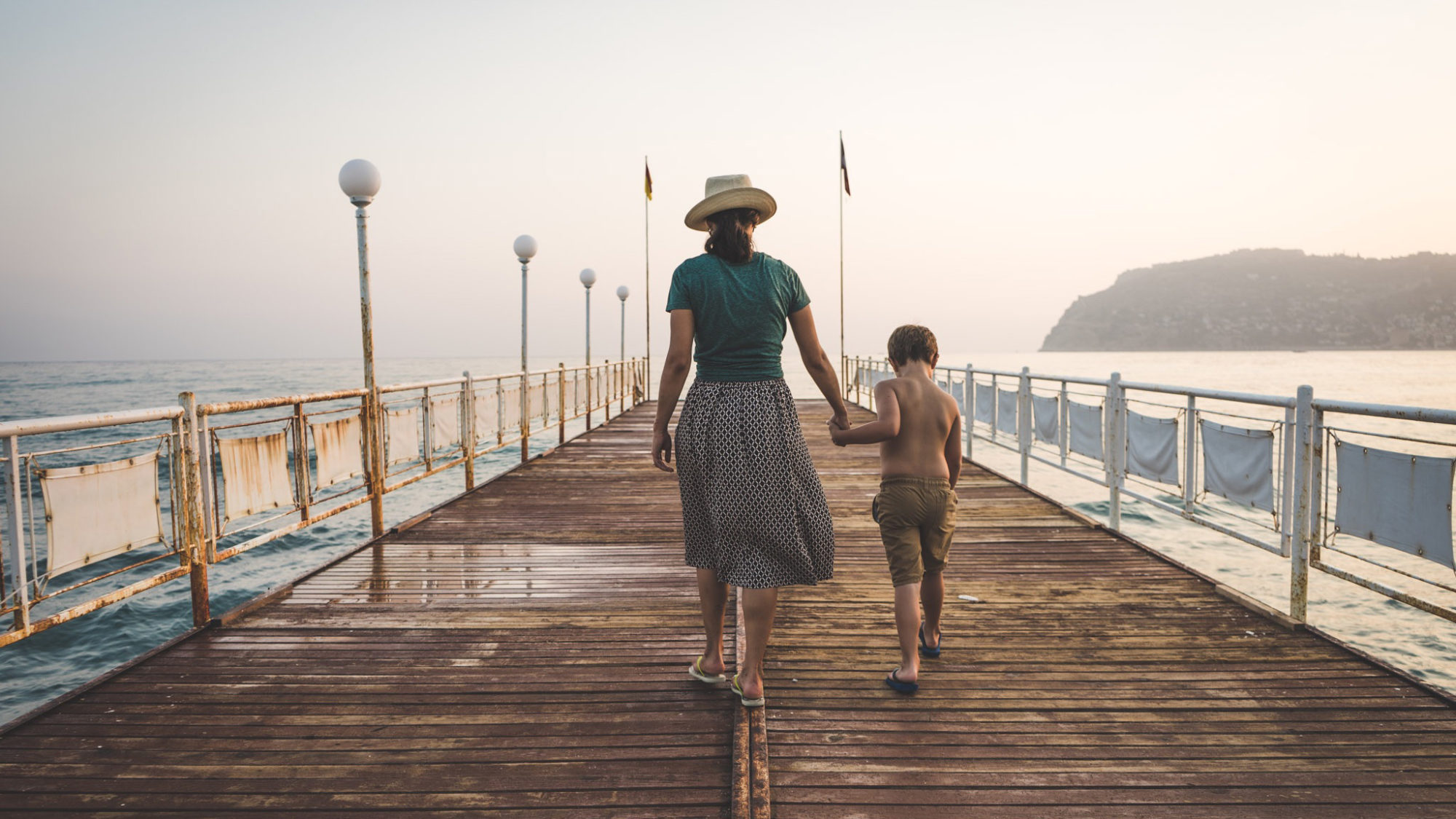
We all heard the snarling of the pack of dogs about the same time. My daughter screamed. I raced to the swing set where my four-year-old son had fallen in the sand. I hadn’t seen the attack obscured by a hedge of bushes, but I saw the stray dogs scattering afterward. We’d been to this park dozens of times and the playground had always been safe, so my son had raced ahead to beat us to the swings. He didn’t sense the hunger of the dogs lingering there.
Within less than twenty-four hours, we were on a flight out of the country to get a series of post-exposure shots for rabies. We spent two weeks staying with friends in Europe while my son was immunized against the deadly disease. One dark night in the room where we were sleeping, I found myself gazing at my son, pondering taking him back to the city where there’s danger lurking in a public park designed for children to play.
I knelt in the dark beside the bed and laid my head on the mattress beside his warm body. The only prayer I was praying that night was, “Lord take this cup from me.” Don’t ask us to go back. Let us live somewhere safe, somewhere comfortable, somewhere far away from that snarling pack of dogs. And I wondered if the deep-distressed reluctance to do the hard thing God was asking me to do was similar, even in some small manner, to the way Jesus felt in Gethsemane. Jesus’s prayer spoke through the silence and became my own.
“Jesus shows us that pleading for the bitter cup to pass is not faithlessness—it’s faithful.”
A week later we got on a plane. God didn’t withdraw his call. He didn’t ask us to change course. Jesus told us that if we want to follow him, then we have to deny ourselves and take up our cross daily (Luke 9:23). When Jesus stood up and walked out of Gethsemane toward the cross, he showed us what obedience looks like in practice. He showed us that sometimes God calls us toward suffering, not away from it. So we packed our bags, and we went back.
The Loneliness of Gethsemane
Two years later, I spent the week of Easter in the hospital holding my son’s hand. He’d been admitted for pneumonia five days earlier. After so many bags of IV antibiotics, he was improving, but in that clinical environment he looked so pale, so frail. All my kids struggle with respiratory infections every winter. The pollution of the city coupled with the dryness of the air inside our apartment warmed by radiators seems to make them more susceptible to the viruses populating schools, minibusses, and public spaces. They always get sick. In the winter, I dread the sound of a croupy cough more than anything else.
That week in the hospital felt so lonely. Even though we received a flood of messages via email and social media from concerned friends and talked on Skype with family, the digital communication just seemed to underscore their distance from us. For the better part of the week, I was alone with my son, contemplating the slow drip of the IV fluids, and praying that his lung didn’t collapse. And again I thought of Jesus in Gethsemane.
In the hospital, I could feel Jesus’s loneliness in the garden in a way I never had before. I could imagine how he felt when he found the disciples sleeping rather than waiting up with him in prayer. He wasn’t angry, just acutely aware of his solitariness in suffering. They couldn’t enter into his pain. When we’re on mission, there are moments when no one can enter into the depths of our sorrow or alleviate the loneliness that eventually accompanies God’s call. But Gethsemane shows us that God speaks to us even when we feel most alone. In the garden, the Father sent an angel to strengthen Jesus (Luke 22:43) but didn’t allow his Son to change course. In the morning, Jesus would still carry his cross.
An Invitation into the Intimacy of Gethsemane
To those of us called to cross-cultural mission, Gethsemane is a gift. Because glimpsing this moment in Jesus’s life where we see his humanity so fully on display gives us permission to identify with him during the long dark night of struggling with God over a painful call. Even though nothing we ever experience will come close to the pain he bore taking on the sin of the world, Jesus shows us that pleading for the bitter cup to pass is not faithlessness—it’s faithful. Acknowledging the excruciating cost of obedience is not rebellion; it’s honesty in God’s presence.
Jesus’s honesty in prayer while wrestling over his call reflects his deep intimacy with the Father. If we don’t feel like we can cry out to God, “Take this cup from me,” then we don’t know the intimacy of Gethsemane. In the garden, Jesus didn’t put up a façade of strength and triumphalism, he wept tears of blood in anticipation of the cross.
“In the garden, Jesus didn’t put up a façade of strength and triumphalism, he wept tears of blood in anticipation of the cross.”
God allows us to mourn the heaviness of carrying our cross so long as our wrestling ends with Jesus’ statement of submission: “Not my will, but yours, be done” (Luke 22:42 ESV). Jesus’s prayer in Gethsemane carries him into Good Friday, where he faces the shame of being stripped, the taunts of crowds who completely misunderstand his mission, and the physical pain of crucifixion. But Gethsemane also paves the way for Easter Sunday morning, when death is overcome by life, when the tomb no longer has claim over the living Lord. In cross-cultural mission too, the intimacy of Gethsemane fuels us to endure difficulty so we can experience the joy of resurrection.
Meeting God in Gethsemane
Last Easter Sunday morning I stood in our local church, and I was afraid. ISIS had released a video on the internet targeting a dozen pastors in our country, including ours. The American embassy had sent out notices warning of potential terrorist attacks on churches and Christians during the Easter holiday. Our church has one entrance in and out and it isn’t guarded. We’re an easy target. I stood there gripping the seat in front of me, barely able to focus on the words of the hymn I was singing. There I was on Easter Sunday morning still feeling like I was in Gethsemane. I was still praying for this cup to pass, still praying that God would allow us to live in a place where we don’t have to be afraid when we come to worship, pray, and fellowship with other believers.
But over the years I’ve learned that when we kneel down in Gethsemane, we meet God there. In our brokenness, God ministers to us and strengthens our souls for whatever will come tomorrow. Sometimes we’ll face a painful experience, but more often we awake to days suffused with joy. In either case, God is with us in the journey. Our call is to say, “Not my will, but yours, be done.”


